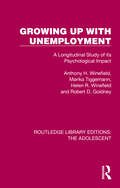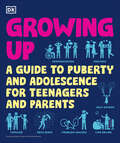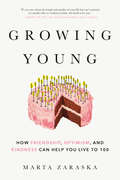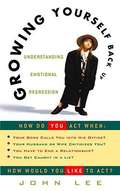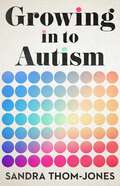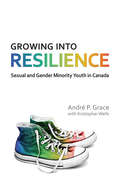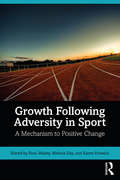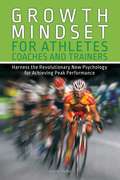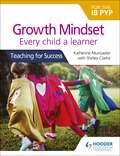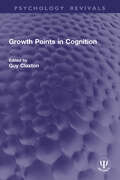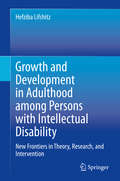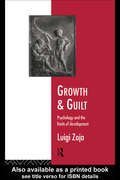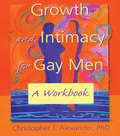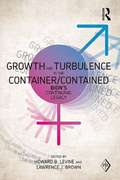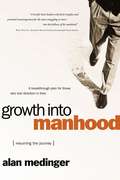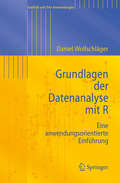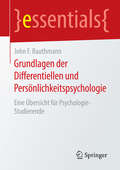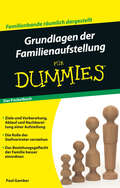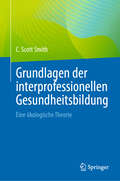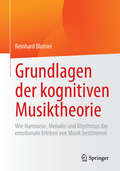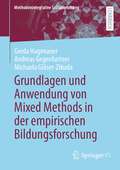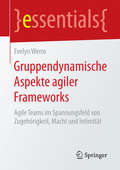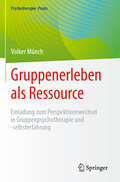- Table View
- List View
Growing Up with Unemployment: A Longitudinal Study of its Psychological Impact (Routledge Library Editions: The Adolescent)
by Anthony H. Winefield Helen R. Winefield Robert D. Goldney Marika TiggemannThe transition from school to work is recognized by developmental psychologists as a significant phase in maturation of young people. In the 1990s the likelihood that the transition might be delayed by a period of prolonged unemployment was greater than any time since the 1930s. The psychological consequences of such a delay need to be understood because they may be damaging to both the individual and to society, particularly if they are long-lasting. Such an understanding is essential for the development of sound policy in relation to youth unemployment. Originally published in 1993, Growing up with Unemployment describes a major longitudinal study of a large group of South Australian school leavers through the 1980s. It assesses the scale and context of the problem and reviews the methods and theories that have been developed to study the psychological impact of unemployment. It also looks at those factors which may contribute towards helping young people cope with it, such as financial security, social support and being involved in constructive activities with other people. The authors also examine how we might be able to predict future unemployment and understand the relationship between it and alcohol consumption, smoking and drug use. This book describes a major study with important implications for employment policy, as well as future theory and research. This title will be interesting historical reading for students of psychology and social policy, policy makers and all those who deal with young people.
Growing Up: A Teenager's and Parent's Guide to Puberty and Adolescence (DK Help Your Kids)
by DKDeal with the ups and downs of growing up. This visual guide to puberty and adolescence is a must-read for all parents and tweens embarking on those scary teenage years. This growing up book covers contemporary issues such as internet safety and tackles key topics such as sexuality and body image. Demystify puberty with this must-read home reference book. From your menstrual cycle to sexting, and even cyber-bullying.This straightforward, unpatronizing approach to tricky topics is the essential illustrated guide to adolescence for both parents and their teens. The stunning graphics and illustrations make this invaluable for tweens and teens alike.Help Your Kids With Adolescence is a guide for modern kids coming into their teen years. It addresses topical issues like body image, the effects of social media, and sexting. It also offers a biological explanation for the physical side of being a teenager from mood swings, periods, and breaking voices. This book offers a no-nonsense, non-judgemental approach to help parents and their kids navigate their way through puberty and adolescence. Sexuality, Confidence, Social Media, Emotions, Stress!Puberty and adolescence can be a confusing and complex time. Help Your Kids With Adolescence offers straightforward advice to help parents and children survive and thrive during the turbulent teenage years. Emotional well-being, physical changes, online safety, family dynamics, relationships, sexuality, and much more are discussed and explained through jargon-free text and simple, clear illustrations. Engaging graphics and illustrations make this modern, comprehensive guide to adolescence invaluable for tweens and teens alike. Whether as a quick-reference guide or cover-to-cover read.This self-understanding and self-development book will discuss and explain the following topics:- Growing Up- Female Puberty- Male Puberty- Healthy Body- Healthy Mind- Achieving Potential - Digital Life- Sexuality- Relationships - And more.DK's bestselling Help Your Kids With series contains crystal-clear visual breakdowns of important subjects. Simple graphics and jargon-free text are key to making this series a user-friendly resource for frustrated parents who want to help with children get the most out of life. Get help with anything from geography and music to maths, SATs, and growing up.
Growing Young: How Friendship, Optimism, and Kindness Can Help You Live to 100
by Marta ZaraskaA smart, research-driven case for why optimism, kindness, and strong social networks will help us live to 100.From the day her daughter was born, science journalist Marta Zaraska fretted about what she and her family were eating. She fasted, considered adopting the keto diet, and ran a half-marathon. She bought goji berries and chia seeds and ate organic food. But then her research brought her to read countless scientific papers and to interview dozens of experts in various fields of study, including molecular biochemistry, epidemiology and neuroscience. What Marta discovered shattered her long-held beliefs about aging and longevity. A strong support network of family and friends, she learned, lowers mortality risk by about 45 percent, while exercise only lowers it by about 23 percent. Volunteering your free time lowers it by 22 percent or so, while certain health fads like turmeric haven't been shown to help at all. These revelations led Marta Zaraska to a simple conclusion: In addition to healthy nutrition and physical activity, deepening friendships, practicing empathy and contemplating your purpose in life can improve your lifespan. Through eleven chapters that take her around the world, from catching wild mice in the woods of central England to flower arranging with octogenarians in Japan, from laboratories to "hugging centres," Marta embarks on an absorbing, entertaining and insightful journey to determine the habits that will have the greatest impact on our longevity. Deeply researched and expertly reported, Growing Young will dramatically change the way you seek a longer, happier life.
Growing Yourself Back Up: Understanding Emotional Regression
by John LeeSomeone pushes your buttons . . . you feel rage . . . fear . . . sweaty palms . . . unbidden tears . . . you feel like a kid . . . We've all experienced moments when we lose control of a situation and ourselves. Now, inGrowing Yourself Back Up, the first book to explain the idea of emotional regression to the general reader, bestselling author John Lee identifies the circumstances that cause these seemingly uncontrollable feelings and shows how they are directly tied to our experience as children. No adult, explains Lee, need ever experience the helpless feelings of childhood again. Here are his proven methods and visualization exercises, developed in his popular workshops, for recognizing, preventing, and diffusing regression in ourselves and others. He teaches, for example, that adults cannot be abandoned, they can only be left; if we're feeling abandoned we're regressing. He also reminds us that no matter how overwhelmed we are, adults always have options; if we believe we don't, we're in a regression. Growing Yourself Back Up will show you how to: * develop strong emotional boundaries and convey them to others * learn the Detour Method that reverses regression * confront without regressing * communicate with the authority figures who push your buttons * minimize regression at family functions Lee offers hope--as well as practical strategies that work--for conquering those childlike feelings of powerlessness that are almost always rooted in regression.
Growing in to Autism
by Sandra Thom-JonesFrom the outside looking in, Sandra Thom-Jones was living a successful life: she had a great career, a beautiful home, a loving family and supportive friends. But from the inside looking out, she was struggling to make sense of her place in the world, constantly feeling overwhelmed and exhausted, and convinced that her challenges with daily life just meant that she had to try harder. In Growing in to Autism, Sandra tells the story of gradually realising she was autistic, and that she experienced the world in ways which were markedly different from non-autistic people. Applying her skills as an experienced and expert researcher, Sandra delved into the literature on autism in adults, learning much more than she had already known as a parent of two autistic boys. Part personal, funny, and enlightening memoir, and part rigorous explication of the nature of autism, Growing in to Autism is a book for everyone. This updated edition includes a revised preface and afterword, in which Sandra reflects on reader responses, how the book has furthered her own growth, and the subsequent changes in her life. Reader feedback has also inspired a fully updated chapter on autistic strengths. In the words of her readers, Growing in to Autism helps autistic people feel &‘understood, validated and less alone&’. It also gives non-autistic readers a genuine insight into ways of understanding and making space for a group of individuals in our society who have so much to offer.
Growing into Resilience
by Andre P. Grace Kristopher WellsDespite recent progress in civil rights for sexual and gender minorities (SGM), ensuring SGM youth experience fairness, justice, inclusion, safety, and security in their schools and communities remains an ongoing challenge. In Growing into Resilience, André P. Grace and Kristopher Wells - co-founders of Camp fYrefly, a summer leadership camp for SGM youth - investigate how teachers, healthcare workers, and other professionals can help SGM youth build the human and material assets that will empower them to be happy, healthy, and resilient.Grace and Wells investigate the comprehensive (physical, mental, and sexual) health of SGM youth, emphasizing the role of caring professionals in an approach that that recognizes and accommodates SGM youth. Throughout, the authors draw upon the personal narratives of SGM youth, emphasizing how research, policy, and practice must act together for them to be able to thrive and fulfill their promise.Both a resource for those professionally engaged in work with sexual and gender minorities and a comprehensive text for use in courses on working with vulnerable youth populations, Growing into Resilience is a timely and transdisciplinary book.
Growth Following Adversity in Sport: A Mechanism to Positive Change
by Ross WadeyGrowth Following Adversity in Sport: A Mechanism to Positive Change is the first text to carefully consider the positive changes that may follow adverse experiences in sport at micro (e.g., individual), meso (e.g., dyadic, team), and macro levels (e.g., organizational, cultural). While remaining respectful of the despair and distress that can follow adversity, this comprehensive text aims to provide a narrative of hope to those who have experienced adversity in sport by showcasing the latestadvances in research on growth following adversity. This book covers topics as diverse as: conceptual, theoretical, and methodological considerations; cultural, organizational, and relational perspectives; population-specific insights (e.g., gender, disability, youth); and applied implications (e.g., evidence-based, practice-based). Written and edited by a team of international experts and emerging talents from around the world, each chapter considers the nature and meaning of growth, contains a comprehensive review of empirical research or reflections from professional practice, and offers exciting, novel, and rigorous suggestions for future programs of research that aim to promote positive change in sport to support the safety, wellbeing, and welfare of the people who take part (e.g., athletes, coaches, paid employees, volunteers). Cutting-edge, timely, and comprehensive, Growth Following Adversity in Sport: A Mechanism to Positive Change is essential reading for postgraduate students and scholars in the fields of sport psychology, injury and rehabilitation, sport theory and other related sport science disciplines.
Growth Mindset for Athletes, Coaches and Trainers: Harness the Revolutionary New Psychology for Achieving Peak Performance
by Jennifer PurdieA complete and easy-to-follow guide for inspiring every athlete with the proven power of growth mindsetWhether you&’re a coach, trainer or athlete, growth mindset has changed the game. It&’s helping everyone from little leaguers to professionals reach their full potential. The perfect complement to a physical training regimen, this book shows how to use growth mindset to overcome plateaus and achieve peak performance.With proven strategies and step-by-step examples, this practical handbook shows how to implement growth mindset starting today. The program is based on SMART (specific, measurable, attainable, realistic and timely) goals and offers a range of powerful techniques, including how to:• Use visualization for game-day success• Turn losses into learning opportunities• Improve coach-athlete communication• Build trust among teammates• Stretch athletes beyond their comfort zone• Train with different personalities and ages
Growth Mindset for the IB PYP: Teaching for Success
by Katherine MuncasterGrowth Mindset Teach for success with this 'must-have' handbook for anyone looking to embed a growthmindset culture essential for supporting agency, physical and emotional well-being, andinquiry-based learning. Take the concept of growth mindset and turn it into a powerful reality with practicalstrategies, lesson plans and extensive examples developed by practising teacher andmindset expert Katherine Muncaster and Co-authored by leading professionaldevelopment expert Shirley Clarke. Create a powerful and inviting learning environment throughout your school withdetailed and practical advice to support the physical and emotional development ofyour students. Easy-to-access classroom video clips provide demonstrations of the impact of thisapproach in lessons
Growth Mindset for the IB PYP: Teaching for Success
by Katherine MuncasterGrowth Mindset Teach for success with this 'must-have' handbook for anyone looking to embed a growthmindset culture essential for supporting agency, physical and emotional well-being, andinquiry-based learning. Take the concept of growth mindset and turn it into a powerful reality with practicalstrategies, lesson plans and extensive examples developed by practising teacher andmindset expert Katherine Muncaster and Co-authored by leading professionaldevelopment expert Shirley Clarke. Create a powerful and inviting learning environment throughout your school withdetailed and practical advice to support the physical and emotional development ofyour students. Easy-to-access classroom video clips provide demonstrations of the impact of thisapproach in lessons
Growth Points in Cognition (Psychology Revivals)
by Guy Claxton‘Cognition’ is not so much a field as a forest. It presents the newcomer with an immense wealth of detail: theories, models, terms and findings that are entangled and sometimes seemingly impenetrable. There is plenty of new growth – of which some will thrive and some will not. And a lot of dead wood too, some recognised and some not. How is the student to begin to make sense of all this?Originally published in 1988, Growth Points in Cognition provided a much-needed perspective, presenting those key topics in cognitive psychology that were likely to shape the development of the subject over the next decade. The contributors discuss important areas of cognition such as perception, action, memory, comprehension and problem-solving, and examine the increasingly fruitful interplay between cognition and the allied fields of neuropsychology, cross-cultural psychology, and development. Today it can be read in its historical context.
Growth and Development in Adulthood among Persons with Intellectual Disability: New Frontiers in Theory, Research, and Intervention
by Hefziba LifshitzThis volume advocates an optimistic new conceptual and practical approach to adulthood, aging, and education for individuals with intellectual disability (ID) across the lifespan. The compensation age theory (CAT) at the heart of this book suggests that the adulthood period in populations with ID may be characterized by processes of cognitive development, growth, and neural sprouting, rather than stagnation or even decline. Empirical findings indicate the contribution of chronological age, maturity, and accumulating life experiences to adults’ continued cognitive growth and intelligence, as a result of direct mediation, cognitive intervention, and academic learning as well as exposure to indirect learning. Grounded in cumulative evidence for the CAT, the book presents comprehensive analysis of a practical holistic educational intervention model for enhancing adults’ Cognition (literacy), Affect (including autonomy), and Behavior (adaptive behavior skills), including operative strategies, mediational parameters, and guidance for change agents in diverse settings. This triple CAB model offers detailed tools for promoting the cognitive improvement and invigoration of adults with ID in during ADL, vocational and leisure activities, at all severity levels ranging from mild and moderate to severe and profound, across different ID etiologies including Down syndrome, and even at advanced ages for adults with ID exhibiting comorbid Alzheimer’s.
Growth and Guilt: Psychology and the Limits of Development
by Luigi ZojaThe relentless exploitation of the earth's resources and technologys boundless growth are a matter of urgent concern. When did this race towards the limitless begin? The Greeks, who shaped the basis of Western thinking, lived in mortal fear of humanity's hidden hunger for the infinite and referred to it as hubris, the one true sin in their moral code. Whoever desired or possessed too much was implacably punished by nemesis, yet the Greeks themselves were to pioneer an unprecedented level of ambition that began to reverse that tabu. If it is true that no culture can truly repudiate its origins, and that gods who are no longer potent can vanish but still leave behind a body of myth which coninues to live and assert itself in modernized garb, then our concern with the limits of growth reflects something more than an awareness of new technological problems - it also brings to light a psychic wound a a feeling of guilt which are infinitely more ancient.
Growth and Intimacy for Gay Men: A Workbook
by Christopher J AlexanderGrowth and Intimacy for Gay Men: A Workbook is an educational workbook for gay men that covers a variety of topics, including family of origin, addiction, self-image, dating and relationships, AIDS and multiple loss, and spirituality. Each chapter provides an overview of the mental health concerns of gay men, as well as exercises the reader can do to facilitate his personal understanding of the issues covered. While the book is written in nontechnical language, making it useful to the general public, its wide selection of workbook exercises makes it useful for psychotherapists and counselors working with gay men. Growth and Intimacy for Gay Men is written to the reader--with brief examples from the author’s work as a clinical psychologist helping gay men. A central goal of the book is to normalize the feelings and experiences the reader has, as many gay men feel like they’re the only ones with their feelings or experiences. The book’s problem-solving approach addresses: family of origin--provides exercises to identify and examine gay men’s role in the family, examine their childhood perceptions of being different, and help them map out family patterns and dynamics self-image--includes self-image assessment questionnaires and written exercises that challenge the reader to look at how they’re affected by societal perceptions addiction--explores why gay men are vulnerable to addictive behavior and offers strategies for change and self-assessment exercises dating and relationships--covers the unique challenges faced by gay men, with exercises for single as well as coupled men AIDS and mental health--provides exercises to help the reader examine the impact of AIDS on his own life and to assess the impact of multiple loss and prolonged grief Readers can do the workbook exercises on their own, or therapists can assign chapters and exercises as homework, with clients bringing the completed assignment to therapy for more in-depth exploration and discussion. By providing informative chapters and useful exercises, Growth and Intimacy for Gay Men becomes an avenue through which gay men can understand their identity, experiences, and goals.
Growth and Turbulence in the Container/Contained: Bion's Continuing Legacy (Psychoanalytic Inquiry Book Series)
by Howard B. Levine Lawrence J. BrownWilfred Bion remains the most cited author in psychoanalytic literature after Sigmund Freud. His formulation of alpha function, waking dream thoughts, his theory of thinking and of the container/contained have proven seminal for the elaboration of psychoanalytic theory and practice, as well as the exploration of psychic functioning and the primordial mind. Growth Turbulence in the Container/Contained is based on papers presented at the 2009 International Bion Conference held in Boston, Massachusetts. It represents the state of the art thinking of an outstanding international group of Bion scholars and experts. This book includes the most current trends in Bion scholarship, covering topics that range from the historical/biographical, to the clinical, the theoretical, the developmental, to the cultural and aesthetic. Proving a vital stimulus to further creative explorations in the field, Growth Turbulence in the Container/Contained will be of particular interest to psychoanalytic practitioners, graduate psychoanalysts, analytic candidates, psychoanalytic therapists, advanced therapy trainees,and scholars of all schools.
Growth into Manhood: Resuming the Journey
by Alan MedingerA breakthrough plan for males to re-enter the world of men. What happens when a boy grows physically into an adult male but misses some of the experiences and relationships that help form complete manhood? Alan Medinger writes for such men and for those who care about them. Within the context of his own release from homosexuality and his growth into confident and comfortableo manhood, Medinger offers hope to others. For homosexually oriented men, such growth is an essential but often overlooked step in the process of healing. This ground-breaking study could well change many lives.
Grundlagen der Datenanalyse mit R
by Daniel WollschlägerDieses Buch liefert eine anwendungsorientierte Einführung in die Grundlagen der Datenauswertung mit dem freien Statistikpaket R. Es behandelt deskriptive Auswertungen ebenso wie inferenzstatistische Analysen. Neben den geläufigsten univariaten Verfahren berücksichtigt es nonparametrische sowie ausgewählte multivariate Methoden. Zudem deckt es die vielfältigen Möglichkeiten ab, Diagramme zu erstellen und Daten mit anderen Programmen auszutauschen. Die statistischen Verfahren werden an Beispielen erläutert und an vielen Stellen mit Diagrammen illustriert. Hinzu kommen manuelle Kontrollrechnungen, um die Ergebnisse von R Schritt für Schritt nachvollziehbar zu machen. Das Buch richtet sich an alle, die R kennenlernen und in konkreten Aufgabenstellungen einsetzen möchten, ohne bereits über Vorerfahrungen mit befehlsgesteuerten Programmen oder Programmiersprachen zu verfügen.
Grundlagen der Differentiellen und Persönlichkeitspsychologie: Eine Übersicht für Psychologie-Studierende (essentials)
by John F. RauthmannJohn F. Rauthmann vermittelt eine Übersicht über die Grundlagen der Differentiellen und Persönlichkeitspsychologie: Methoden, Persönlichkeitsbereiche, Ansätze, Determinanten der Persönlichkeit und ausgewählte Forschungsbereiche. Der Autor beschränkt sich dabei auf das Wesentliche - somit eignet sich das Essential vor allem für Studierende der Psychologie, die sich einen schnellen Gesamtüberblick über das Fach verschaffen wollen.
Grundlagen der Familienaufstellung für Dummies Pocketbuch
by Paul GamberFamilienbande können in widrigen Zeiten eine starke Stütze sein, sie können aber auch Wunden hinterlassen, die ein Leben lang schmerzen. Paul Gamber zeigt, wie Sie durch eine Familienaufstellung herausfinden können, welche Rolle Sie in Ihrer aktuellen oder Ihrer Herkunftsfamilie spielen und wie sich die Beziehungen auch über Generationen hinweg gebildet haben. Sie erfahren, was es mit der Rolle der Stellvertreter auf sich hat und wie ungeklärte Konflikte nicht nur die Vergangenheit und Gegenwart belasten, sondern auch auf die Zukunft ausstrahlen. So können Sie die Erkenntnisse aus einer Familienaufstellung für eine positive Neuorientierung nutzen.
Grundlagen der interprofessionellen Gesundheitsbildung: Eine ökologische Theorie
by C. Scott SmithDieses Buch führt in eine Theorie der ökologischen Psychologie innerhalb der interprofessionelle Gesundheitsbildung ein. Die Grundlagen sind Affordanzen (Merkmale der Umgebung, die die Möglichkeit bieten, erkannt und genutzt zu werden), die Lebenswelt (was die bedeutungsvolle Umgebung für den Lernenden enthält) und Verhaltenssettings (von Menschen geschaffene Affordanzen, die spezifische Verhaltensweisen erlauben, unterstützen oder dagegenwirken). Die Erweiterung der Lebenswelt ist der Hauptmechanismus des Lernens im Gesundheitswesen. Das Bewusstsein für absichtliche und unbeabsichtigte Merkmale des Verhaltenssettings hilft uns, die curriculare Umgebung zu strukturieren, um diese Erweiterung der Lebenswelt zu erreichen. Das Buch ist in vier Aspekte unterteilt: der natürliche Aspekt, der mentale Aspekt, der soziale Aspekt und die Nichtlinearität. Der abschließende Anwendungsteil bietet eine Struktur für die Gestaltung, Implementierung und Evaluation des Bildungsprogramms in einem professionellen Gesundheitsumfeld. Dieses Buch ist ideal für Gesundheitsmanager interprofessioneller Gesundheitseinrichtungen sowie für Lehrende und Studierende aus verschiedenen Disziplinen, z. B. Medizin, Pflege, Pharmazie, Psychologie, Sozialarbeit.
Grundlagen der kognitiven Musiktheorie: Wie Harmonie, Melodie und Rhythmus das emotionale Erleben von Musik bestimmen
by Reinhard BlutnerDas Buch unternimmt den Versuch, eine Darstellung der modernen Musiktheorie zu geben, die wesentlich von Einsichten der Kognitionswissenschaften bestimmt ist. Das Buch wendet sich somit an Leser*innen, die eine Verbindung suchen zwischen kognitiver Psychologie, Linguistik, Neurowissenschaft auf der einen Seite und der Musikwissenschaft auf der anderen. Das vorliegende Werk basiert auf naturwissenschaftlichen Sockeln. Die Darstellung geht dabei in vielerlei Hinsicht über das hinaus, was in traditionellen Musiktheorien vermittelt wird. Es wird nämlich versucht, die mutmaßlichen Gesetze der Musik zu finden und zu begründen, soweit dies nach dem gegenwärtigen Stand der Wissenschaft möglich ist.
Grundlagen und Anwendung von Mixed Methods in der empirischen Bildungsforschung (Methodenintegrative Sozialforschung)
by Andreas Gegenfurtner Gerda Hagenauer Michaela Gläser-ZikudaDas Buch gibt einen Einblick in Mixed Methods in der empirischen Bildungsforschung. Der Fokus liegt auf der Kombination von qualitativen und quantitativen Forschungszugängen, die aktuell sehr prominent in der empirischen Bildungsforschung diskutiert werden.Die Inhalte sind gleichermaßen für Studierende wie Forscher:innen verständlich aufbereitet, die sich bisher noch nicht mit Mixed Methods beschäftigt haben. Daher werden die methodologischen Grundlagen kurz beschrieben (mit Verweisen auf Vertiefungsliteratur) und mit konkreten Beispielen aus der empirischen Bildungsforschung verknüpft.
Grundlagen von Sport und Sportwissenschaft: Handbuch Sport und Sportwissenschaft
by Arne Güllich Michael KrügerDieses Handbuch bietet einen kompletten Überblick über zentrale Themen der Sportwissenschaft. Es richtet sich an das breite Publikum der Fachleute, Lehrenden und Wissenschaftler*innen im Sport. Hier können Sie sich kompakt und kompetent über den Stand der Wissenschaft und der Kultur des Sports informieren. Das Handbuch ersetzt bisherige Lexika und Handbücher zum Sport.Die Texte sind verständlich formuliert und anschaulich aufbereitet. Die über 30 Kapitel in diesem Grundlagenband geben Ihnen den aktuellsten wissenschaftlichen Stand zur Sportwissenschaft und ihren Grundthemen, Kultur und Geschichte des Sports, Theorie und Praxis der Sportarten und Bewegungsfelder. Zudem erhalten Sie Hinweise auf die wichtigste nationale und internationale Forschungsliteratur.
Gruppendynamische Aspekte agiler Frameworks: Agile Teams im Spannungsfeld von Zugehörigkeit, Macht und Intimität (essentials)
by Evelyn WerroEvelyn Werro zeigt in diesem essential, wie mit einem neuen agilen Organisationsparadigma und Scrum als einem der agilen Frameworks versucht wird, der durch die neuen Technologien getriebenen, wachsenden Komplexit#65533;t im wirtschaftlichen Kontext zu begegnen. Dabei erl#65533;utert sie, dass Teams als eine spezifische Auspr#65533;gung einer Gruppe in diesem Prozess eine oft untersch#65533;tzte, aber entscheidende Rolle spielen. Die Autorin stellt Fragen wie: Inwiefern spielen dabei gruppendynamische Erkenntnisse eine Rolle? Wie erfolgreich kann Scrum sein, wenn den impliziten gruppendynamischen Aspekten explizit keine Beachtung geschenkt wird? Und was bedeutet dies f#65533;r die Arbeitsf#65533;higkeit von Teams?
Gruppenerleben als Ressource: Einladung zum Perspektivenwechsel in Gruppenpsychotherapie und -selbsterfahrung (Psychotherapie: Praxis)
by Volker MünchDieses Fachbuch für Psychotherapeuten und Gruppentherapeuten regt den Leser, die Leserin entlang des eigenen Lebenslaufs an, eigene Gruppenerfahrungen neu zu reflektieren – und diese Einsichten in Beziehung zu Therapieprozessen zu setzen. Psychisches Leben und persönliche Entwicklung entsteht immer in Netzwerken. Analytische Gruppentherapie nutzt dies und macht psychische Vorgänge sichtbar, die in Einzelbehandlungen zu oft unklar bleiben. Unser Bild der psychischen Entwicklung des Menschen wandelt sich angesichts neurowissenschaftlicher Erkenntnisse und vor dem Hintergrund komplexer gesellschaftlicher Herausforderungen unserer Zeit in ein Bild des Menschen als Social Animal. Wir sehen einen Aufschwung für die Gruppentherapie und eine Öffnung gegenüber Theorien, die unsere gegenseitige Abhängigkeit in einem positiven Sinn betonen. Zusammengehörigkeit und Solidarität können so gemeinschaftlich eingeübt werden und transformatorische Kraft für Veränderung beim Einzelnen, aber auch für dieGesellschaft entfalten. Viele lebensnahe Beispiele vor allem aus therapeutischen Gruppen illustrieren dies. Geschrieben für:Psychotherapeut*innen, Gruppenpsychotherapeut*innen, Gruppenleiter*innen im medizinischen und sozialen Bereich.Über den Autor: Dipl. Psych. Volker Münch, Psychologischer Psychotherapeut in eigener Praxis in München. Lehranalytiker, Supervisor und Dozent an der MAP, München. Veröffentlichungen zu den Themen Therapeutische Haltung, Digitalisierung, Krise in der Lebensmitte.
